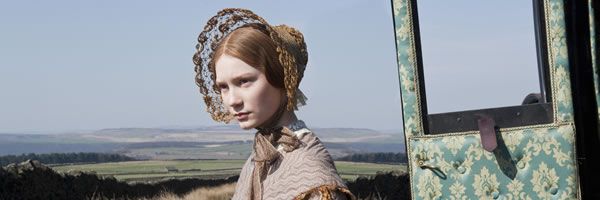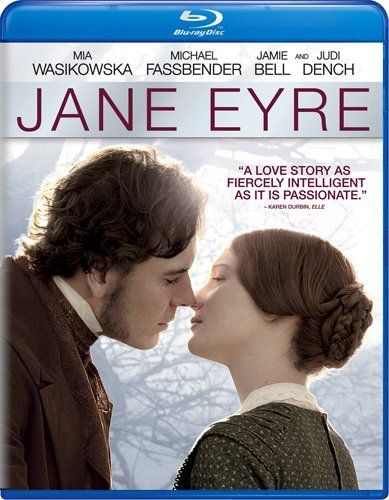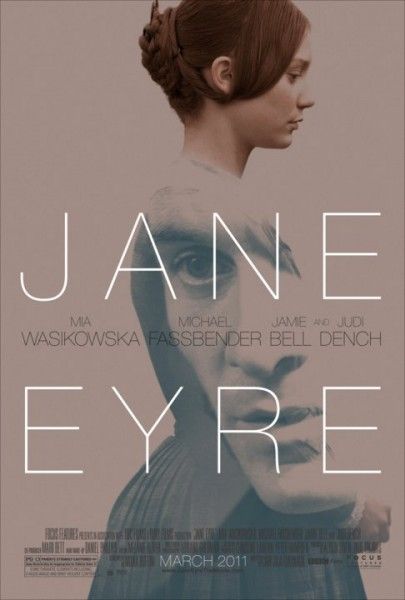Literary adaptations are a mixed bag. A handful of such films (The Shining, for example) actually surpass the books upon which they are based. Many more are plain awful. And countless lit flicks—regardless of the films’ merits compared to those of the books—undergo such far-reaching changes, sacrifices and/or additions to make the stories more filmic as to be only loosely connected to their source material. Cary Fukunaga’s Jane Eyre, the latest of many filmed versions of Charlotte Brontë’s classic novel, scores high marks both for quality and for being an extremely faithful adaptation. Hit the jump for my full Blu-ray review.
The story, for those who slept through high-school English: after a horrible childhood—first at the hands of her guardian aunt, Mrs. Reed (Sally Hawkins), and her aunt’s family and then at the Lowood School for Girls—Jane Eyre (Mia Wasikowska) lands a job at Thornfield Hall as the governess of Adele Varens (Romy Settbon Moore), the French ward of Edward Fairfax Rochester (Michael Fassbender). Rochester finds Jane unlike any other woman he has ever met, and both secretly long for the other. Eventually Rochester asks Jane to marry him. The wedding, however, is interrupted by the revelation that Rochester is already married.
Rochester takes Jane to a locked off portion of Thornfield Hall and introduces her to Bertha (Valentina Cervi), his mentally insane wife whom he was forced to marry by his father for her money, and the cause of many mysterious occurrences around the manor. Distraught, Jane runs away and is saved from freezing to death on the moors by the Reverend St. John Rivers (Jamie Bell) and his two sisters. Jane lies about her name, but St. John uncovers her true identity and learns that her uncle has died, bequeathing her a fortune of £20,000. In gratitude, Jane offers to share the money with him and his sisters. But when St. John asks her to marry him, Jane runs away again, returning to Thornfield Hall only to find the building in ruins. She learns that Bertha escaped and burned Thornfield ablaze, dying in the process. Jane then finds Rochester, blind from injuries sustained in the fire, and they both proclaim their love for each other, never to part again.
Mia Wasikowska delivers a wonderful, nuanced performance in the title role, filled with subtlety, restraint and multi-layered emotions. She is ably supported by the rest of the cast, as director Fukunaga manages to craft an enthralling picture that cuts against the grain of what one has come to expect from period dramas—all the more compressive considering the familiarity of the story as both a book and countless other productions. To be fair, structure is somewhat odd, initially consisting of an extended intercut of Jane’s young life with her runaway sequence before switching to a straightforward chronological narrative when she first comes to Thornfield Hall. What I found puzzling was not the intercut, which worked from a character development standpoint, but the switch away from it—almost like two distinct films style-wise.
Special note should be made of Dario Marianelli’s beautiful score and especially Adriano Goldman’s cinematography. The latter plays heavily in Jane Eyre not feeling or looking like your typical period film. The photography is cold, harsh and unsentimental, and much of it is handheld. The indoor shots are lit mostly with practicals; the outdoor shots often have an epic sensibility; and the romantic close-ups have the intimacy and motion of flirtatious home video.
Special features are lacking in quantity, accustomed as I am to the volume of inclusions in most Blu-Ray releases, although being an indie (Focus Features), perhaps I should not be surprised. There are your standard director’s commentary and deleted scenes, along with three featurettes. Sadly the most extensive of the featurettes, “A Look Inside Jane Eyre” is also the least interesting and most cookie-cutter, a typical making-of that everyone has seen dozens of times. In comparison, “To Score Jane Eyre: Cary Fukunaga and Dario Marianelli Team Up” and “The Mysterious Light of Jane Eyre” are far too brief (on the order of 1-2 minutes—were they originally web videos or interstitials?), but far more informative and interesting.
In summation, Jane Eyre is that rare modern adaptation of a literary classic already shot to death that manages to score on all fronts and deliver a new and original interpretation.



